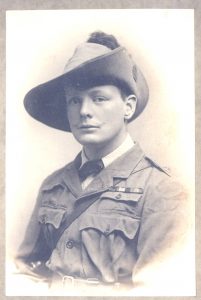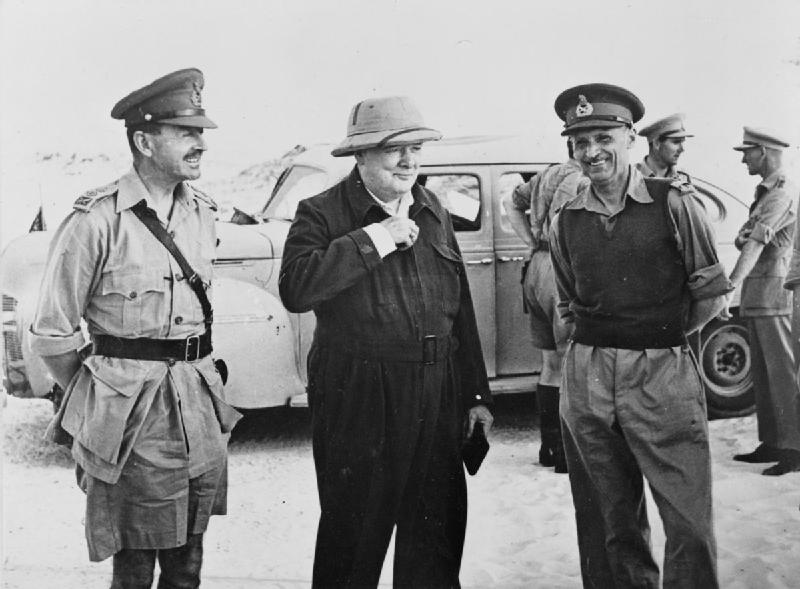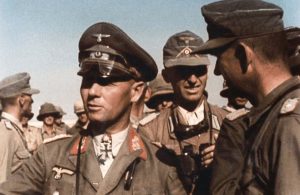
Finest Hour 181
“Rommel, What Else Matters but Beating Him?”

Alexander, Churchill, and Montgomery in North Africa
December 20, 2018
Finest Hour 181, Summer 2018
Page 18
By Bradley Tolppanen
Bradley Tolppanen is author of Churchill in North America, 1929 (2014).
In the summer of 1942, after two years of fighting in the desert, British fortunes in North Africa reached their lowest ebb. Rommel and his German-Italian army inflicted a severe defeat on the Eighth Army at Gazala in May, captured Tobruk in June, and forced the British into a tumultuous retreat from Mersa Matruh deep into Egypt later that same month. With smoke billowing over Alexandria as the British burned their papers in the expectation of Rommel’s imminent arrival, the Afrikakorps reached the Alamein line. Under Sir Claude Auchinleck, the Middle East Commander-in-Chief who had sacked Neil Ritchie and taken personal command of the Eighth Army, the British halted the Axis advance in stiff fighting through the first week of July. Poorly coordinated counter-attacks through July, however, failed to dislodge Rommel. In a stalemate, the two exhausted armies paused to resupply, and both “settled down in acute discomfort plagued by flies, heat, desert sores, and all-pervading sand as they dug, wired, and mined their respective front lines.”1
As fighting petered out at Alamein, Prime Minister Winston Churchill grew increasingly concerned. He had watched the disastrous events of the summer unfold from both Washington, where he was in conference with the American president, and on his return to London. The surrender of Tobruk, which had withstood a siege in 1941, had been a particular blow. Now, with Rommel sixty miles from Alexandria, Churchill was little disposed to brook excuses. He would later exclaim, “Rommel, Rommel, Rommel, Rommel, what else matters but beating him?”2

2025 International Churchill Conference
The prime minister had had a difficult relationship with his theatre commander since Auchinleck’s appointment as Commander-in-Chief in succession to Sir Archibald Wavell in mid-1941. In the first months of 1942, the prime minister had pressured the general in a series of cables to resume the offensive against Rommel, in part to relieve the pressure on Malta. Auchinleck had frustrated Churchill with his unwillingness to launch what he considered a premature offensive. During the summer, personal interviews with army officers returning from Egypt caused Churchill even greater anxiety about the senior army leadership in the Middle East and the morale of the Eighth Army. In typical Churchillian fashion, he decided to go see for himself. At the end of July 1942, having already planned to travel to Moscow to meet Stalin, the prime minister decided to go to Cairo first and “settle the decisive questions on the spot.”3
Our Man in Cairo
At half-past eight on the morning of 3 August 1942, a converted four-engine Liberator bomber landed at an airfield twenty miles northwest of Cairo. The aircraft carrying the prime minister and his party, piloted by American Captain Bill Vanderkloot, had just completed a daring 2,000 mile flight from Gibraltar that took them over Vichy-controlled French North Africa and the vastness of the Sahara desert. After making a rather undignified exit from the belly of the Liberator, Churchill was greeted by a reception party that included Ambassador Miles Lampson, Minister Resident Dick Casey, and Air Chief Marshal Arthur Tedder. The prime minister, dressed in the uniform of a Royal Air Force Air Commodore, looked “incredibly cherubic” and was in “great heart.” He was exhilarated. No longer in faraway London awaiting news, he was now “the man on the spot.”4
From the airfield the prime minister went to the British embassy, which would serve as his residence while in Cairo and where he would receive exceptional hospitality from his hosts. At Churchill’s request, the notables were gathering in the Egyptian capital. Chief of the Imperial General Staff Sir Alan Brooke had arrived shortly before Churchill, South African Prime Minister Jan Smuts arrived from Pretoria about lunchtime, and Wavell—now Commander-in-Chief, India—reached Cairo the following day. Over the next several days, Churchill held almost continuous talks with the top military and political officials in the theatre as he “collected opinions from all useful quarters.” He had come to Cairo to answer two questions: “Had General Auchinleck or his staff lost the confidence of the Desert Army? If so, should he be relieved, and who could succeed him?”5

After holding discussions with Brooke and Auchinleck on the afternoon of his arrival, Churchill met the next morning with Lieutenant-General Thomas Corbett, the Chief of the General Staff at Middle East headquarters. The meeting undoubtedly raised concerns in the mind of the prime minister, as he was surprised to learn that Corbett was to succeed Auchinleck as the next commander of the Eighth Army. He told Churchill that he had been “living with my kit packed for the last week” in the expectation of going to the front.6 The prospect of such a non-entity as Corbett commanding the Eighth Army in the field against Rommel was ludicrous and confirmed that Auchinleck was a poor picker of subordinates. He had twice selected commanders for the Eighth Army (Alan Cunningham and Neil Ritchie) and twice had to sack them at moments of crisis. Corbett, following in the wake of Cunningham and Ritchie, suggests Auchinleck wanted a weak and pliable commander at the Eighth Army who could be dominated. Churchill, who thought Corbett “a very small, agreeable man of no personality and little experience” and unfit to command a division, let alone an army, was unimpressed.7 Another of Auchinleck’s staff officers also damaged his standing. Major General Eric Dorman-Smith, the deputy chief of general staff at Cairo, was widely thought to have a malign influence on his boss and to be responsible for many of the mistakes made by the army. He was regarded as “a menace of the first order.”8
On the evening of 4 August, Churchill held a long conference with the senior officials gathered in Cairo, including Auchinleck and Brooke. Auchinleck was closely questioned about the date of his next offensive in the desert. The prime minister was displeased with the answers. Churchill later wrote, “We did a lot of business with a very great measure of agreement. But all the time my mind kept turning to the prime question of command.”9
That night Churchill discussed the command of the Eighth Army with Brooke and pressed for the appointment of Lieutenant-General “Strafer” Gott, or failing that for General “Jumbo” Wilson. In the first two years of the desert war, Gott had become a legend in the Eighth Army, while the sixty-year-old Wilson had commanded the ill-fated expedition to Greece and the invasion of Syria. Churchill knew neither man personally. Although he thought very highly of Gott, Brooke believed he was tired after hard campaigning, while he considered Wilson too old (an opinion he revised later in the war). Brooke argued, instead, for Lieutenant-General Bernard Montgomery to come out from England. Montgomery, a complete professional, was considered by Brooke to be “bounding with self-confidence and capable of instilling this confidence to all those under his command.”10 The discussion dragged on until one o’clock in the morning without agreement.
At the Front
Early on the morning of 5 August, Churchill and his party left the embassy to visit the Alamein front, first flying to an airfield west of Alexandria and then motoring to the army positions. The prime minister was in high spirits. Enduring the extreme heat, Churchill, accompanied by Auchinleck, visited formations of the Eighth Army, including the Australian division. They then drove to the Eighth Army headquarters, located behind Ruweisat Ridge, where the prime minister was given breakfast in Auchinleck’s austere mess: a kind of netted cage filled with flies. Churchill also met a series of corps and division commanders, including the Australian Morshead, New Zealander Inglis, Major-General William Ramsden, and Gott. After breakfast Auchinleck, joined by Dorman-Smith, presented his plans to Churchill. Dorman-Smith bitterly recalled the prime minister pressed for an early offensive, with his “pudgy fingers stabbing at the map as he threw imaginary divisions here and there.”11
Having spent the morning with the army, Churchill departed to spend the afternoon with the Royal Air Force. He asked Gott to drive alone with him to the airfield. As they jolted over the desert tracks, Churchill was impressed with the general’s ability and personality. He judged him in no way tired. That afternoon, his air force hosts took more care in their duties than their army colleagues. The RAF had ordered luncheon from Shepherd’s Hotel in Cairo, which although late eventually arrived by car. That evening Churchill flew back to the Egyptian capital. He found that the troops were “very cheerful” and confident but seemed “bewildered at having been baulked of victory on repeated occasions.”12
Decisions
After having seen the situation in person, Churchill made his decision; “new strong hands” were needed. On the morning of 6 August, a “very elated” Churchill briefed Brooke on his conclusions. Walking up and down in his room at the embassy, the prime minister proposed that the Middle East theatre should be split, a scheme that Brooke had previously advanced, with Persia and Iraq spliced off into a new command. Auchinleck, who had lost Churchill’s confidence, would take that new command while Brooke would replace him in Cairo as Middle East theatre commander and Montgomery would take the Eighth Army. Brooke, despite the attraction of a field command, immediately declared his taking over to be the wrong move. Although he did not say so to Churchill, he felt he could be of best service by remaining as CIGS, where he could exercise some influence on the prime minister. Churchill glumly accepted Brooke’s rejection. With Brooke declining the appointment, General Harold Alexander was chosen to come out to Egypt. Alexander, who had commanded at Dunkirk and in Burma, possessed among other traits both charm and patience, characteristics that would help him in dealing with a succession of temperamental generals. Gott would get the army command. Brooke retained his “serious misgivings” about Gott, given his tired state, but was not “sufficiently convinced of the degree of this disadvantage to oppose the appointment.”13 Corbett, Dorman-Smith, and Ramsden would all be sacked. Having won Brooke’s agreement, Churchill prepared a cable to the War Cabinet outlining the decisions and declaring that a change of command was needed. Overall, Brooke believed the changes were for the best. The sacking of Auchinleck, while distasteful, was necessary, since the Eighth Army was lacking in confidence and poorly coordinated.
After inspecting the 51st Highland Division on 7 August, Churchill returned to the embassy and was told after dinner by an aide that his plans decided only the day before had been overtaken by events. Gott had been killed. A German fighter had shot down the aircraft carrying the general back to Cairo; he had been flying the same route Churchill had flown two days before, also without fighter escort. Churchill “felt grief and impoverishment at the loss of this splendid soldier.”14 Nonetheless, shortly after receiving the news, Churchill regrouped with Smuts and Brooke. After some argument, as Churchill held out for Wilson’s appointment, Brooke and Smuts won his approval for Montgomery. A cable was sent ordering Montgomery to Egypt.
There remained the task of informing Auchinleck of his dismissal. Churchill wrote the necessary letter and entrusted its delivery to Ian Jacob, one of his military staff. On 8 August, Jacob flew to Eighth Army headquarters. He abhorred the task, for he “felt as if I was going to murder an unsuspecting friend.”15 Auchinleck took the blow with fortitude and dignity. The following day he returned to Cairo and had a one-hour conversation with Churchill alone, during which the general declined the new Persia and Iraq Command. Churchill said the hour was “at once bleak and impeccable.”16
New Brooms
On 10 August, Churchill met with Alexander, who had arrived in Egypt the day before, and provided him the directive “to take or destroy at the earliest opportunity the German-Italian Army commanded by Field-Marshal Rommel, together with all its supplies and establishments in Egypt and Libya.”17 At midnight Churchill departed by air for Tehran and then Moscow to meet Stalin. By the time he returned to Cairo from the Soviet Union, both Alexander and Montgomery were in place. On 19 August, Churchill again flew up to the front and visited the Eighth Army. At army headquarters, Montgomery gave a detailed explanation of his plans. Brooke thought him quite impressive. After spending the night at Montgomery’s headquarters, the prime minister inspected several formations the following day, including the 4th Hussars, his old regiment, and Freyberg’s New Zealanders. After the tour, Churchill felt sure that they had been “heading for disaster under the former regime,” but that “a complete change of atmosphere has taken place.” The prime minister was now “satisfied that we have lively, confident, resolute men in command.”18
Churchill flew from Egypt for London on 23 August. A week later, Rommel launched an offensive at Alam Halfa that was thwarted by the Eighth Army, which, in turn, two months later evicted the Germans and Italians from Egypt at the Battle of El Alamein. The appointment of Alexander and Montgomery to command in North Africa had achieved the decisive victory Churchill and the British had been seeking ever since Dunkirk. It was the “End of the Beginning.”
In 1942 the dismissal of Auchinleck and appointment of Alexander and Montgomery was widely supported in military and political circles. “Monty” quickly imposed his personality on the Eighth Army. The change of command in Cairo, however, became very controversial after the war, with historians John Connell and Correlli Barnett both bitterly arguing a revisionist brief on Auchinleck’s behalf that he had been unjustly sacked. Many of Barnett’s claims were based on interviews with Dorman-Smith, whose army career never recovered from being dismissed in August 1942. After the war he moved to Ireland and become an active supporter of the Irish Republican Army. With the publication of the fourth volume of Churchill’s memoirs, The Hinge of Fate, Dorman-Smith sued in a Dublin court over a reference to his being dismissed in 1942. An out of court settlement was arranged in which a short footnote was added to future copies of the volume that indicated no personal blame was attached to any individual. This, a minor success at best for Dorman-Smith, was more permanent than anything he and Auchinleck achieved against Rommel in Africa.
Endnotes
1. W. G. F. Jackson, The Battle for North Africa, 1940–41 (New York: Mason Charter, 1975), p. 261.
2. Charles Richardson, From Churchill’s Secret Circle to the BBC: The Biography of Lieutenant General Sir Ian Jacob (London: Brassey’s, 1991), p. 123.
3. Winston S. Churchill, The Hinge of Fate (Boston: Houghton Mifflin, 1950), p. 452
4. Arthur Tedder, With Prejudice: The War Memoirs of Marshal of the Royal Air Force Lord Tedder (London: Cassell, 1966), p. 319; Charles Wilson Moran, Churchill: Taken from the Diaries of Lord Moran (Boston: Houghton, 1966), p. 54; Churchill, p. 456.
5. Churchill, p. 456.
6. Ibid.
7. Richardson, p. 117.
8. Ibid.
9. Churchill, p. 357.
10. Alex Danchev and Daniel Todman, eds., War Diaries, 1939–1945: Field Marshal Lord Alanbrooke (Berkeley: University of California Press, 2001), p. 290.
11. Correlli Barnett, The Desert Generals (New York: Viking, 1961).
12. Martin Gilbert, ed., The Churchill Documents, Volume XVII, Testing Times 1942 (Hillsdale: Hillsdale College Press, 2014), p. 1039.
13. Danchev and Todman, p. 294.
14. Churchill, p. 468.
15. Richardson, p. 122.
16. Churchill, p. 468.
17. Gilbert, p. 1054.
18. Ibid., pp. 1102–03.
Subscribe
WANT MORE?
Get the Churchill Bulletin delivered to your inbox once a month.




